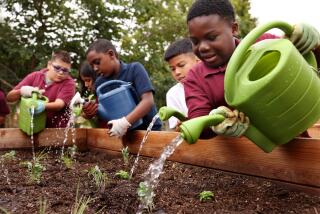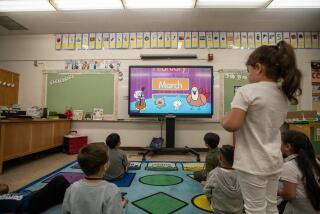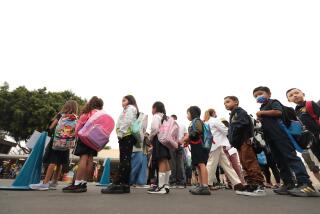Elementary Launches Tolerance Program
- Share via
Take a group of rich kids from south of Ventura Boulevard and bring them together with a rainbow of ethnically diverse kids from poorer neighborhoods to the north and it can make for a volatile mix.
To break down the racial, cultural and socioeconomic barriers that had kept students apart, Dixie Canyon Avenue Elementary School officially launched its PeaceBuilders program Monday to help students appreciate the ways they are the same and to value their special differences.
At a schoolyard assembly, students honored their commitment to be kind to their peers, teachers, family and neighbors through songs, dances, poems, skits and cheers.
“Before the PeaceBuilders program began, the kids used racial slurs, curse words and fistfights to deal with problems,” said Principal Melanie Deutsch. “Now, the kids say they are sorry and they are willing to own up to what they did wrong.”
The students’ commitment to praise rather than put-down has extended into their homes. “These little kids go home and tell their older siblings and their parents that they are not being PeaceBuilders and, in their innocence, they are very effective,” said Gloria Victor Gold, executive director of the Halcyon Center, a nonprofit counseling and education organization, who introduced PeaceBuilders at Dixie Canyon.
Groundwork for the PeaceBuilders program was laid well before the start of the school year, Deutsch said.
Back then, a core group of teachers and parents met to draft a tolerance program to make the most of the school’s multicultural diversity. A few weeks later, Deutsch learned about PeaceBuilders and invited Gold to speak to the group, which embraced the program.
When school opened in September, Deutsch said, teachers gently encouraged students to praise and help one another. Over time, kindness replaced meanness, she said.
The PeaceBuilders program was launched four years ago in Tucson, Ariz., Gold said, after a Centers for Disease Control study concluded that by fifth grade, children have already adopted 80% of the behaviors that indicate how they will treat others as adults.
“If we can modify their behavior before fifth grade,” Gold said, “we can reduce behaviors that can lead to problems later on.”
More to Read
Sign up for Essential California
The most important California stories and recommendations in your inbox every morning.
You may occasionally receive promotional content from the Los Angeles Times.













